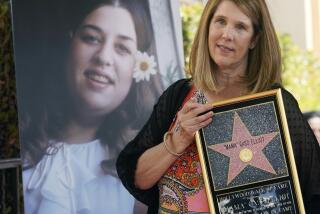FOR CLAYTON, THE GLOOM IS GONE
- Share via
Merry Clayton’s spine-chilling vocal on the Rolling Stones’ “Gimme Shelter” is one of the most famed in ‘60s rock. But the 1969 classic brings painful memories to Clayton: The physical strain of the intense duet with Mick Jagger resulted in a miscarriage after the session.
So audiences’ frequent requests for “Gimme Shelter” might sting like salt in an old wound. Clayton, who performs at the Gardenia Room on Friday, says she was buoyed by her religious upbringing in combating the loss.
“That was a dark, dark period for me, but God gave me the strength to overcome it,” she said recently, taking a break during a hectic weekend spent preparing to perform on saxophonist David Sanborn’s next album.
“I turned it around,” she continued. “I took it as life, love and energy and directed it in another direction so it doesn’t really bother me to sing ‘Gimme Shelter’ now. Life is short as it is and I can’t live on yesterday.”
The Sanborn project is the first step in a campaign to restore the high-visibility career Clayton enjoyed in the ‘70s as a solo artist and a leading session vocalist. Her recent focus has been on lucrative but uncredited sessions for advertising jingles.
The lower career profile, she says, was a conscious decision.
“I was definitely changing priorities, thank God,” Clayton explained. “It was time that I hung at home and did what I needed to do as a parent and that felt good in my heart and my stomach. I continued to do tours and commercials for Carnation and Budweiser, but basically I was being a wife and a mom.”
Clayton, who’s married to saxophonist Curtis Amy, also found time last year to join Brilliance, a contemporary gospel group that includes her godmother, Della Reese, and O.C. Smith. The group is currently shopping an album, but her participation has already won rave reviews from one critic.
“My dad wants me to sing gospel and doing this has made him very happy,” Clayton said. “It also took me back to being the little girl sitting next to him in the pulpit singing ‘Amazing Grace’ every Sunday morning. When you go back to your roots, it helps you keep the proper perspective on what you are about.”
Clayton started singing in her father’s Los Angeles church choir when she was 5. By 14, she had graduated to pop sessions as a background vocalist.
She arranged with school counselors to have gym class scheduled for sixth period, and was regularly plucked from school by producer-arranger Jack Nitzsche to work with the Blossoms vocal group.
The Blossoms backed Tom Jones in the studio and Clayton also worked on the “Shindig” TV show. A 1964 duet with Bobby Darin gave the youthful Clayton some name recognition, but her big break came when childhood chum Billy Preston arranged an audition with Ray Charles in 1966.
“By my father, being a minister, the only person I could go see perform would be Ray Charles,” remembered Clayton. “That was a big thing to me every year, and I would stand right in front and look up in awe at the Raelettes.”
The exposure Clayton received during her 5 1/2-year stint as the lead singer of the Raelettes shifted her session schedule into overdrive. In addition to “Gimme Shelter,” she worked on Joe Cocker’s memorable early records and Carole King’s mega-platinum “Tapestry” LP. Clayton also originated the role of the Acid Queen in the London stage production of “Tommy.”
She kicked off a moderately successful solo career in the early ‘70s. Two solo albums for MCA in the early ‘80s were her last releases, but Clayton also moved into the film world, appearing in “Blame It on the Night” and writing and performing the music for “9 1/2 Weeks.”
Clayton is working on a book about her experiences in the music industry. The final chapter may remain unwritten for some time.
“I never really went anywhere, but my visibility was a little low,” Clayton acknowledged. “They say Tina Turner made a great comeback, but she was in Vegas and Europe, working forever before then. When they don’t see you in the United States, they feel you’re not doing anything.
“I’ll be glad to come back if that’s what they want to call it.”
More to Read
The biggest entertainment stories
Get our big stories about Hollywood, film, television, music, arts, culture and more right in your inbox as soon as they publish.
You may occasionally receive promotional content from the Los Angeles Times.










